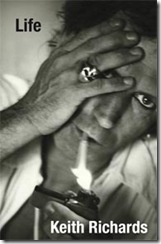Although the Rolling Stones’ “Jumpin’ Jack Flash” was released in 1968, I think the first time I heard it was the summer of 1972, when I was between 8th and 9th grade. I went to a dance at my high school and a local band was playing that song. It was LOUD. I remember standing there on that wooden floor in the gym and trying to absorb the sound. It rocked like nothing I had ever heard. Up until that point, I’d lead a pretty sheltered life in Catholic school, and since we’d just moved to another state and I was finally going to be attending the public school in the fall, that was the first time I’d actually been exposed to the real world, so I wasn’t even quite sure what “rocked” was; I just knew the song got me in the gut, a place where “Put Your Head on My Shoulder” by The Lettermen—a song my best friend Mary-Beth used to listen to—couldn’t come close to touching in me.
In his newly-published autobiography, “Life,” Keith Richards understands this. He writes, “It’s not something you take in the head, it’s something you take in the guts.”
And later he says,
That feeling is worth more than anything. There’s a certain moment when you realize that you’ve actually just left the planet for a bit and that nobody can touch you … and when it works, baby, you’ve got wings. You know you’ve been somewhere most people will never get … it’s flying without a license.
This is what I’m talking about. Need I explain further? Nope.
When I think of Keith Richards, what initially comes to mind is drugs, drugs, drugs, rough and tough, “Street Fighting Man” rock and roll, and Robin Williams’ joke about how if everyone in the world were to perish due to chemical warfare, the only things that would survive would be Keith Richards and cockroaches.
So when I read “Life,” I was surprised and impressed that after all the drugs he’s done, Richards is articulate, intelligent and well-read. It’s a long book, 547 pages, including pictures of Keith growing up in England, on the road with the Stones and performing with various artists like Chuck Berry, Paul MCartney, John Lee Hooker, Tom Waits, and others. My favorite however, is a picture of Keith, barefoot and lounging on a settee while strumming his guitar in the middle of his library at his house in Connecticut. There are books and pillows scattered everywhere, bottles and debris all over the desk, record albums lined up on the bottom shelves and a handwritten sign that reads “Keith Richards Main Offender.” If a picture is worth a thousand words, I think that photo pretty well sums up my impression of him after reading his book.
Other than Richards’ intelligent mind, what impressed me the most was his repeated acknowledgment of the fact that he doesn’t feel like he’s better than anyone else and that all he really wanted and still wants to do, is play the blues. He writes:
It was all dripping with sexual lust, though they [girls in the ‘50s and ‘60s] didn’t know what to do about it. But suddenly you’re on the end of it. It’s a frenzy. Once it’s let out, it’s an incredible force. You stood as much chance in a fucking river full of piranhas … These chicks were coming out there, bleeding, clothes torn off, pissed panties, and you took that for granted every night. It was the gig. It could have been anybody, quite honestly. They didn’t give a shit that I was trying to be a blues player.
Later, he says,
…maybe some of the songs opened up their hearts a little, or their minds, to the idea of we’re women, we’re strong. But I think the Beatles and the Stones particularly did release chicks from the fact of ‘I’m just a little chick.’ It was not intentional or anything. It just became obvious as you were playing to them. When you’ve got three thousand chicks in front of you that are ripping off their panties and throwing them at you, you realize what an awesome power you have unleashed.
Each observer feels something different when experiencing art, be it a book, a concert, a photograph, or what have you. For me, the aspect of this book that really stood out was the human element—how the music of the Stones changed people—especially women, because that’s a very important element of my book too. And if I could just put my finger on exactly what that is… I keep trying.
In any case, just hearing it from Keith’s perspective makes me feel like he and I share an understanding of something that’s greater than what’s on the surface. And while he writes about some technical guitar stuff and his relationship with Mick Jagger and the others involved, this book is not written with the expected “I’m a big star, worship me” kind of attitude. How refreshing. Richards shares with us how it feels to be Keith Richards—his frustrations and joys with drugs and being labeled an “outlaw” (which he ultimately decided he might as well live up to), the rush of being onstage in front of thousands of people, and how it felt when his and Jagger’s songwriting jelled.
This is what makes “Life” such a great read, because through Richards, I too, can experience what that must have been like. But those same feelings are available to all of us. I don’t mean that we can, or should aspire to be Keith Richards or Mick Jagger or even musicians, or that we should do drugs. I mean that by discovering whatever it is in our own lives that brings us those same feelings that completely fill us up, we can be whole. And that’s what life and “Life” is all about.
Thanks for sharing, Keith. Incredible, awesome book.
For more information, please click the image above.

